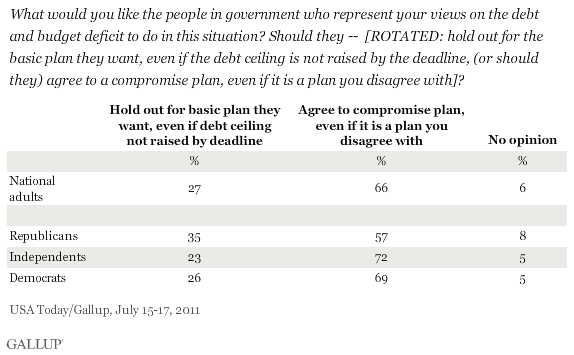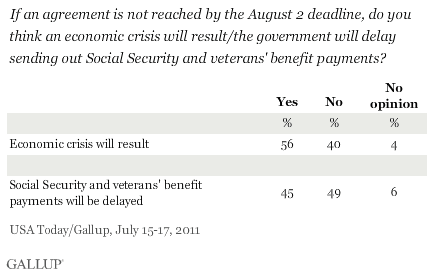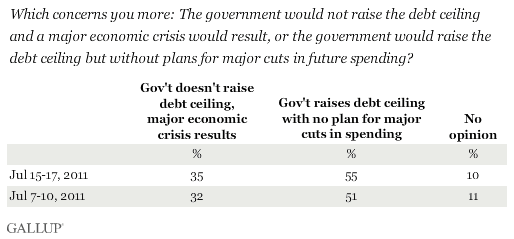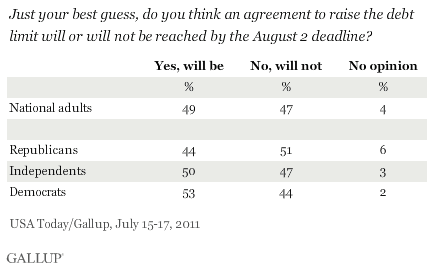PRINCETON, NJ -- Two-thirds of Americans would like government officials to agree to a compromise plan on the debt and budget deficit negotiations now underway. Fewer than 3 in 10 want lawmakers who share their views on the debt and budget deficit to hold out for their desired plan. A majority of Republicans, independents, and Democrats favor reaching a compromise.

These results, from a July 15-17 USA Today/Gallup poll, come as President Obama and congressional leaders continue to wrangle over a number of different types of agreements that could be reached in time to raise the debt ceiling before the Aug. 2 deadline.
Obama held two press conferences last week on this topic, and in each portrayed himself as willing to compromise, while arguing that not all Republican leaders have reciprocated. Rank-and-file Republicans, however, believe compromise is in order, with 57% saying leaders should agree to a compromise plan, even if it's a plan the respondent disagrees with. Independents and Democrats are somewhat more likely to support a compromise.
Majority Predict Economic Crisis if No Agreement Is Reached
Fifty-six percent of Americans believe an economic crisis will result if an agreement is not reached by the Aug. 2 deadline, which helps explain the majority emphasis on reaching a compromise. Close to half, 45%, think Social Security and military benefit payments would be delayed if an agreement is not reached.

Americans Worry That Final Plan Won't Include Major Spending Cuts
Americans continue to express a strong desire that any agreement that is reached include plans for major cuts in future spending. Americans now by a 20-point margin -- 55% vs. 35% -- say they worry more that the government would raise the debt ceiling without plans for major spending cuts, than that the government would not raise the ceiling and an economic crisis would ensue.

Americans appear to be saying to their elected representatives: Get an agreement done, even if it is not an ideal plan, but make sure it includes major spending cuts.
The ongoing negotiations in Washington suggest that leaders on both sides of the aisle are attempting to heed public opinion. The sticking points are matters of degree -- how major the spending cuts will be, and whether the spending cuts are accompanied by some type of concomitant tax increase.
Almost Half of Americans Doubt Agreement Will Be Reached by Deadline
In the midst of all the political back and forth, Americans are none too optimistic that an agreement to raise the debt limit will be reached by Aug. 2. Forty-nine percent say it will, while 47% say it will not. Republicans tilt more toward the "will not be reached" side, while Democrats tilt slightly toward the more optimistic position.

Bottom Line
Americans would like their representatives in Washington to compromise and get a debt agreement in place before the Aug. 2 deadline, but at the same time are concerned that any such agreement include major spending cuts.
Survey Methods
Results for this USA Today/Gallup poll are based on telephone interviews conducted July 15-17, 2011, with a random sample of 1,016 adults, aged 18 and older, living in all 50 U.S. states and the District of Columbia.
For results based on the total sample of national adults, one can say with 95% confidence that the maximum margin of sampling error is ±4 percentage points.
Interviews are conducted with respondents on landline telephones and cellular phones, with interviews conducted in Spanish for respondents who are primarily Spanish-speaking. Each sample includes a minimum quota of 400 cell phone respondents and 600 landline respondents per 1,000 national adults, with additional minimum quotas among landline respondents for gender within region. Landline telephone numbers are chosen at random among listed telephone numbers. Cell phone numbers are selected using random-digit-dial methods. Landline respondents are chosen at random within each household on the basis of which member had the most recent birthday.
Samples are weighted by gender, age, race, Hispanic ethnicity, education, region, adults in the household, and phone status (cell phone only/landline only/both, cell phone mostly, and having an unlisted landline number). Demographic weighting targets are based on the March 2010 Current Population Survey figures for the aged 18 and older non-institutionalized population living in U.S. telephone households. All reported margins of sampling error include the computed design effects for weighting and sample design.
In addition to sampling error, question wording and practical difficulties in conducting surveys can introduce error or bias into the findings of public opinion polls.
View methodology, full question results, and trend data.
For more details on Gallup's polling methodology, visit www.gallup.com.
